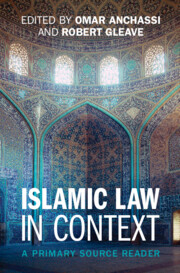Book contents
- Islamic Law in Context
- Islamic Law in Context
- Copyright page
- Contents
- Acknowledgements
- Contributors
- Introduction
- Part I Islamic Legal Theory (Uṣūl al-Fiqh) and Related Genres
- Part II Islamic Jurisprudence (Fiqh) and Related Genres
- Chapter 7 Introduction to Part II
- Chapter 8 The Kitāb al-Umma, or Ṣaḥīfat al-Madīna
- Chapter 9 Section on Lawful Food from al-Mabsūṭ fī Fiqh al-Imāmiyya of Muḥammad b. al-Ḥasan al-Ṭūsī (d. 460/1067)
- Chapter 10 ‘The Treatise of Refutation of those who Criticise [Our] Conduct’ (Kitāb al-Radd ʿalā man Ṭaʿana fī l-Sīra) Attributed to Imām al-Mutawakkil ʿalā Allāh, Aḥmad b. Sulaymān (d. 566/1170)
- Chapter 11 Menstruating Women and Visiting the Mosque
- Chapter 12 Section on the Law of Rebellion from the Radd al-Muḥtār of Ibn ʿĀbidīn (d. 1252/1836)
- Chapter 13 Offer and Acceptance in Islamic Marriage
- Chapter 14 Treatise on Jihad and Migration
- Chapter 15 Alms Tax (Zakāt) in Shīʿī Law
- Chapter 16 A Difficult Case of Divorce
- Part III Legal Opinions (Fatwās)
- Part IV Court Judgments and Other Court Documentation
- Part V Judicial Manuals and Reference Books
- Part VI Alternative Sources for Islamic Legal Studies
- Name Index
- Subject Index
- References
Chapter 16 - A Difficult Case of Divorce
Tholaq Samvadam of Abdulla Musliyar (b. 1950)
from Part II - Islamic Jurisprudence (Fiqh) and Related Genres
Published online by Cambridge University Press: 14 November 2024
- Islamic Law in Context
- Islamic Law in Context
- Copyright page
- Contents
- Acknowledgements
- Contributors
- Introduction
- Part I Islamic Legal Theory (Uṣūl al-Fiqh) and Related Genres
- Part II Islamic Jurisprudence (Fiqh) and Related Genres
- Chapter 7 Introduction to Part II
- Chapter 8 The Kitāb al-Umma, or Ṣaḥīfat al-Madīna
- Chapter 9 Section on Lawful Food from al-Mabsūṭ fī Fiqh al-Imāmiyya of Muḥammad b. al-Ḥasan al-Ṭūsī (d. 460/1067)
- Chapter 10 ‘The Treatise of Refutation of those who Criticise [Our] Conduct’ (Kitāb al-Radd ʿalā man Ṭaʿana fī l-Sīra) Attributed to Imām al-Mutawakkil ʿalā Allāh, Aḥmad b. Sulaymān (d. 566/1170)
- Chapter 11 Menstruating Women and Visiting the Mosque
- Chapter 12 Section on the Law of Rebellion from the Radd al-Muḥtār of Ibn ʿĀbidīn (d. 1252/1836)
- Chapter 13 Offer and Acceptance in Islamic Marriage
- Chapter 14 Treatise on Jihad and Migration
- Chapter 15 Alms Tax (Zakāt) in Shīʿī Law
- Chapter 16 A Difficult Case of Divorce
- Part III Legal Opinions (Fatwās)
- Part IV Court Judgments and Other Court Documentation
- Part V Judicial Manuals and Reference Books
- Part VI Alternative Sources for Islamic Legal Studies
- Name Index
- Subject Index
- References
Summary
This chapter explores an extremely involved and technical debate on the dynamics of marriage and divorce among adherents of the Shāfiʿī school of law in Kerala, specifically the intervention of the Keralite jurisconsult ʿAbd Allāh Musliyār (b. ?). The issue in question is the validity of a declaration of unilateral repudiation (ṭalāq) using a particular grammatical construction uttered in front of the husband’s mother-in-law (known locally as the ‘Valapuram Ṭalāq’ case). The effectiveness of this particular form of divorce continues to divide jurists in the community in question, all of whom defer to the authority of the same canonical legal texts, namely the Tuḥfat al-Muḥtāj of Ibn Ḥajar al-Haytamī (d. 974/1566), the Nihāyat al-Muḥtāj of Shams al-Dīn al-Ramlī (d. 1004/1596) and the Fatḥ al-Muʿīn of the prominent Keralite jurist Aḥmad Zayn al-Dīn al-Malaybārī (d. 991/1583).
Keywords
Information
- Type
- Chapter
- Information
- Islamic Law in ContextA Primary Source Reader, pp. 178 - 188Publisher: Cambridge University PressPrint publication year: 2024
